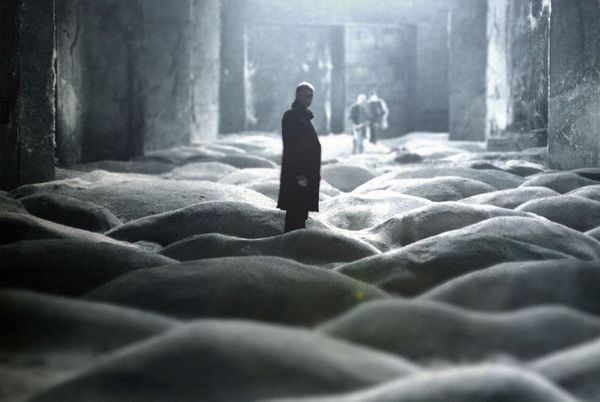Eye For Film >> Movies >> Stalker (1979) Film Review

In the movie world, where sci-fi so often equates to hi-tech space operas, such as Star Wars, or gothic excess, such as The Matrix, it is good to be reminded that there is more to the genre than flashing lightsabers and cool sunglasses. Tarkovsky's Stalker is a film which makes you rethink your perceptions and encourages you to ponder deeper questions of humanity.
The eponymous Stalker makes his living by leading people into a mysterious Zone, much to the chagrin of his long-suffering wife. Thought to have been created by a meteroite or, possibly, an alien species, the Zone is fiercely protected by a government that doesn't want anyone going there, itself included. Yet, within the Zone, is a room with the power to grant the deepest wish of those who dare to seek it out and enter in.

The promise of fulfilment of earthly desire is enough to make a professor (Anatoly Solonitsin) and a writer (Nikolai Grinko) prepared to brave bullets to reach it and we follow their journey as they embark on one of the most thought-provoking road trips ever commited to celluloid.
Getting out of the city proves difficult enough, but when they reach the Zone it seems that the going will not get any easier. We travel with them as they debate the nature of desire and dreams in the physically daunting Zone.
Considering there is little in the way of action and that the plot moves in a slow and epic manner, it is surprisingly tense. The initial scenes in the industrial wastelands of the city are shot in bleak sepia, giving way to the vibrant colour and greenery in the Zone - one thing's for certain, as they step off their hijacked train wagon, they're not in Kansas any more.
The Zone is an oppressive force in its own right, bearing witness to people who have ventured into its confines in the past and never returned, hostile to all but those who treat it with care and reverence. The question is, will our intrepid trio make it through the wilderness and what will they do in the room, if they reach it?
There is no easy watching to be gained here, but nor is this a hard slog - each scene is beautifully crafted, painting a vivid and fascinating picture of Tarkovsky's vision. Once you adjust to the pace and frequent long gaps between dialogue, you begin to welcome the pauses so that you can ponder the questions facing the protagonists at the same time as they do or, if that all gets too much, simply sit back and let the resonant score wash over you - though the version you are listening to (the 5.1 or original mono) will occasionally alter what you hear, more of which later.
The acting is superb throughout, with the enigmatic Stalker paradoxically evangelising the wonders of the Zone while carrying the weight of his own disabled daughter on his shoulders and yet showing no interest in entering the room himself. This internal conflict provides the perfect counterpoint to the analytical and mysterious professor and the self-obsessed alcoholic writer as they find that it is not just the threat of the Zone they must worry about, but the demons they carry within themselves.
There is much that one could make of the symbolism - does it represent a supernatural force, a landscape of the mind or a bizarre parable of the West, where hopes and dreams become reality? The answer, I think, is none of these... and yet all of them, and that is the beauty of the film.
Tarkovsky is adamant that his audience should think about what they are watching and therefore shies away from neatness and resists the urge to lead his viewers by the hand. I suspect that you could watch Stalker a dozen times and get something different from it on each occasion.
What more can you ask of a filmmaker?
Reviewed on: 23 May 2002
















